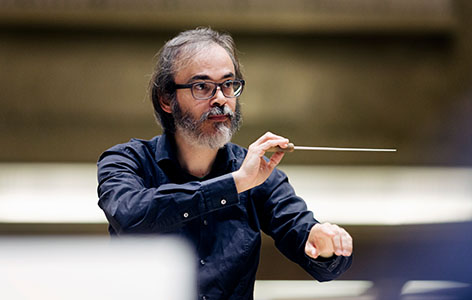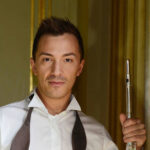| 14. 12. 2023 19:00 p.m. |
| Kino Vesmír |
| from 400 CZK |

A2 One hundred years of Ligeti
One of the greatest personalities of the Western European musical avant-garde of the second half of the last century is the Hungarian composer György Ligeti. Last year, a hundred years have passed since his birth. At the concert, not only Ligeti’s compositions will be heard, but also compositions by authors whose legacy he based his work on.
Igor Stravinsky
Symphony for wind instruments
György Ligeti
Double Concerto for Flute, Oboe and Orchestra
György Ligeti
Clocks and Clouds
Béla Bartók
Three Village Scenes
György Ligeti
Romanian Concerto
Matteo Cesari – flutes
Vilém Veverka – oboe
Jarmila Vantuchová Balážová – mezzo-soprano
Canticum Ostrava (women’s choir)
Yuri Galatenko – choirmaster
Janáček Philharmonic Ostrava
Ilan Volkov – conductor
The year 2023 marks the centenary of the birth of Hungarian composer György Ligeti, one of the greatest figures of the Western European musical avant-garde of the second half of the 20th century. His compositions were featured on the soundtrack of the American cult sci-fi film 2001: A Space Odyssey. His work draws on the neo-folk legacy of Igor Stravinsky and Béla Bartók. The work of these composers will be represented in the concert by Stravinsky’s Symphony for wind instruments from 1920, which he dedicated to the memory of Claude Debussy, and Bartók’s Village Scenes for women’s choir and orchestra, which incorporates Slovak folk songs – and which are the composer’s response to another of Stravinsky’s neo-folk compositions, Wedding.
The rest of the concert will belong directly to Ligeti. His Romanian concert from 1951 will be performed. The piece, which draws on energetic Romanian folk music, was banned after a rehearsal in Budapest because of its modern elements. It was not performed until twenty years later, in 1971. After his emigration to Austria in 1956, Ligeti began working with the compositional techniques of the then Western European musical avant-garde. These are evident in the Double Concert for flute, oboe and orchestra, as well as in the composition Clocks and Clouds, whose title the composer took from an essay by the eminent philosopher Karl Raimund Popper.





